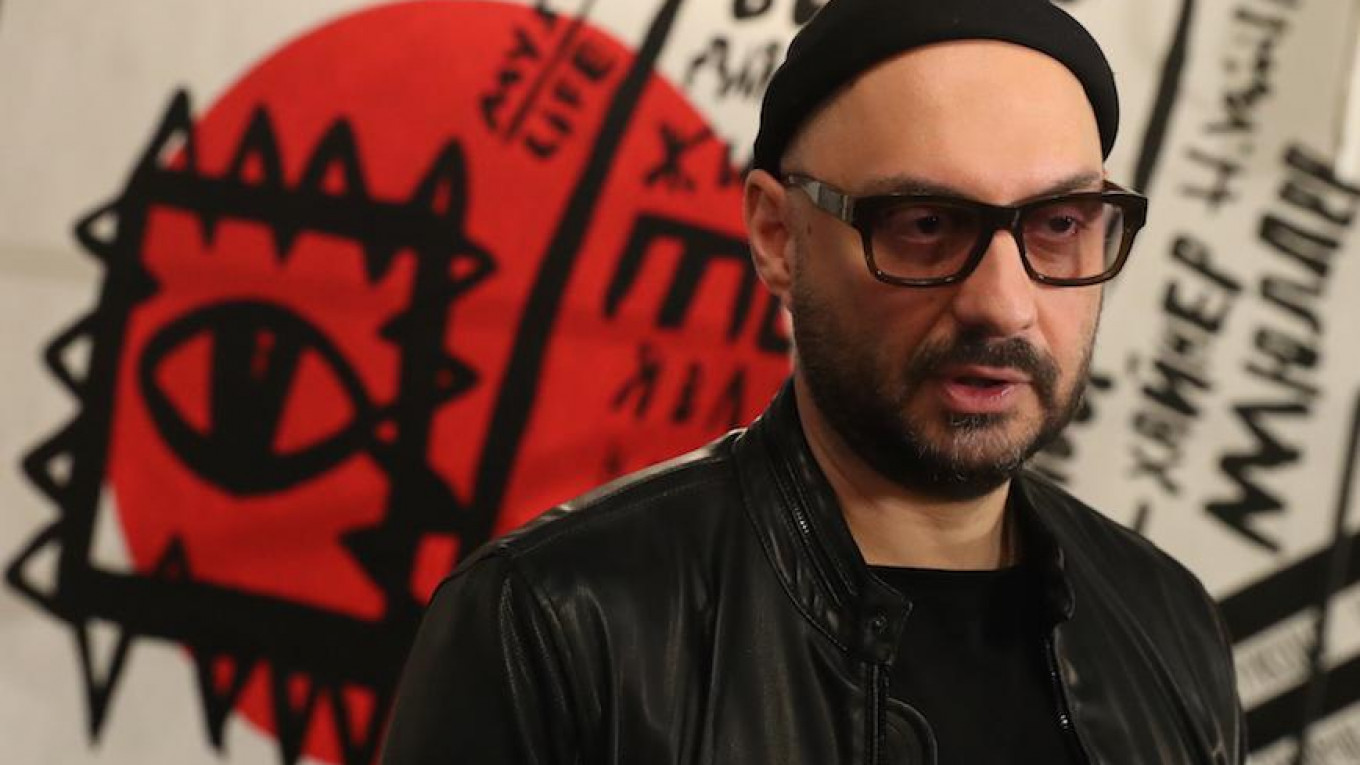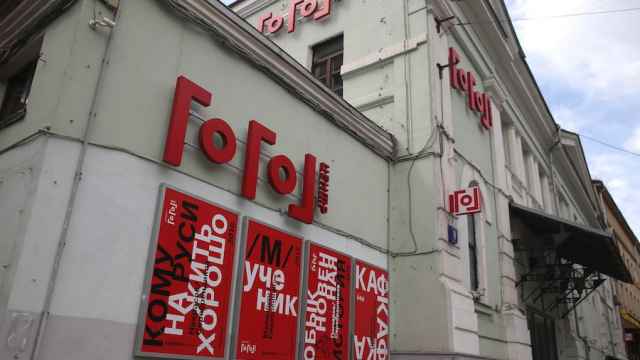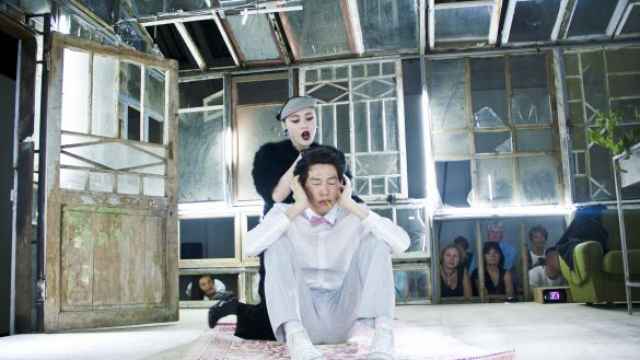One of the most iconic images of Stalin’s terror is a photograph of Vsevolod Meyerkhold, one of Russia’s 20th century most famous theater directors, moments after he was arrested in 1939. Many assumed it would be the last time a Moscow theater director was led into a car by masked men and driven away for interrogation.
On Tuesday, May 23, however, it happened again. This time, the man being led away was Kirill Serebrennikov, Russia’s award-winning theater and film director.
“I am in shock and do not understand [what is going on],” Serebrennikov told the assembled cameras.
Masked men arrived at dawn at Serebrennikov’s home. Later, a similar group arrived at Gogol Center, the theater he runs. A rehearsal was interrupted. Actors and staff had their phones confiscated. Men with guns searched the theater.
One actor told Russian media he felt as if he had been held “by terrorists” during the raid.
These are strange times for Russian theater. On the one hand, state-sponsored conservatism, censorship and the growing influence of the Russian Orthodox Church have led to plays being shut down and theaters threatened.
On another hand, never before has the Moscow theater scene been so popular.
Serebrennikov, 47, is at the cutting edge of this renaissance. In 2012, he was appointed to run the Gogol Center by Moscow culture minister Sergey Kapkov. Under Serebrennikov’s leadership, the Gogol Center became Moscow’s most exciting cultural hub.
At least initially, Moscow’s hottest director was not averse to working with authorities. In 2011, he staged Okolonolya, attributed to the Kremlin’s then powerful gray cardinal Vladislav Surkov.
But the theater’s launch sparked several protests organized by ultra-Orthodox activists who sent letters to prosecutors saying they were offended by nudity and obscene language in Serebrennikov’s plays. As time passed, the director became embroiled in open conflict with the Culture Ministry.
A rebel emerged. Serebrennikov supported protests against Putin’s presidency in 2011. He advocated LGBT rights and even called Russia’s annexation of Crimea the act of “an impoverished thug who has lost his mind.”
His controversial film The Student, which explored matters of indoctrination, won the Francois Chalais prize at the 2016 Cannes Film Festival.
One year on, in the very week that the festival re-opens on the French Riviera, Serebrennikov finds himself being taken away by masked men.
Serious Blow
The raids on Serebrennikov’s theater were more serious than any of the troubles Russian theater has faced recently.
During the raid, Russia’s law enforcement said it was investigating the embezzlement of government art funding. They alleged a number of people had stolen 200 million rubles [US$3.5M] between 2010 and 2014.
The state funds in question were allocated to a production company created and run at that time by Serebrennikov. The company’s former director and accountant were also detained. As of May 24, Serebrennikov was not officially charged with any criminal activity and remains a witness in the case.
Aside from the theater and the director’s apartment, police searched 15 other addresses they say are connected to the case. The raids were reportedly conducted without a court warrant, under an “emergency measures” law of the Russian criminal code.
It is straightforward enough for authorities to build criminal cases around the use of public funds. Many assume serious public action by law enforcement agencies is not always what it seems, and is triggered by behind the scenes political or financial interests.
Authorities have maintained the raids were apolitical. But while Serebrennikov was kept for interrogation for a few hours without contact — an extended procedure even by the standards of Russian politics — Moscow’s art world struggled to understand what was happening.
Unlike businessmen or bureaucrats, Russian artists rarely end in jail for embezzlement or corruption. Some wondered whether Serebrennikov’s detention was instead a signal to other top-officials, perhaps within the culture ministry.
This does not appear to be the case here, a source close to the government suggested to The Moscow Times: The target is most likely Serebrennikov himself.
Final Act
Heavily dependent on state handouts, Russia’s cultural elite generally avoids politics. This time it was different.
Responding to a call to rally, dozens of leading Russian artists, journalists and fans turned up at the theater to protest the raids. Among attendees was celebrity film director Fedor Bondarchuk, a member of the ruling “United Russia” party, who has never been seen at protest rallies before.
“Serebrennikov is the pride of Russia. We cannot not react to this,” Bondarchuk told crowds outside the theater.
A letter signed by Russia’s actors and directors in support of Serebrennikov was read out by actress Chulpan Khamatova. “We all know him as an honest and open person,” it said. The next day, the Bolshoi’s director, Vladimir Urin, wrote a letter to Putin in defense of Serebrennikov.
Journalist and culture analyst Yuri Saprykin told The Moscow Times that the theater has “many” enemies. “There was pressure on the Gogol Center from the start,” he said.
In its five years of staging daring performances, the Gogol Center had survived numerous threats. But with Serebrennikov’s interrogation, some fears the edgy theater’s days might be numbered.
A Message from The Moscow Times:
Dear readers,
We are facing unprecedented challenges. Russia's Prosecutor General's Office has designated The Moscow Times as an "undesirable" organization, criminalizing our work and putting our staff at risk of prosecution. This follows our earlier unjust labeling as a "foreign agent."
These actions are direct attempts to silence independent journalism in Russia. The authorities claim our work "discredits the decisions of the Russian leadership." We see things differently: we strive to provide accurate, unbiased reporting on Russia.
We, the journalists of The Moscow Times, refuse to be silenced. But to continue our work, we need your help.
Your support, no matter how small, makes a world of difference. If you can, please support us monthly starting from just $2. It's quick to set up, and every contribution makes a significant impact.
By supporting The Moscow Times, you're defending open, independent journalism in the face of repression. Thank you for standing with us.
Remind me later.






